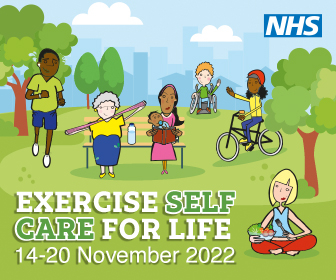We are encouraging staff, service users and the public to ‘exercise self care for life’ in recognition of Self Care Week.
Running from 14-20 November, the dedicated week highlights important self-care messages in the hope of creating a greater impact and reaching more of the population.
The exercise theme has a double meaning, in terms of getting physically active and the act of self care. This includes the whole spectrum of simple daily choices that are not always easy for those with existing mental health conditions, like brushing teeth or choosing to take the stairs, to more complex choices such as protecting mental wellbeing and managing your long term health.
Jo Smith, Health & Wellbeing Strategic Lead said:
“It is so important to practise self care and to promote the importance of self care to everybody. All our lives can be so hectic at times with work and family commitments that we often forget to prioritise ourselves. Even taking a few minutes a day to focus on improving our own mental and physical wellbeing is essential for long term health and happiness.”
Throughout self care week we will be sharing self care hints and tips, these include:
- Increase your daily step goal. Reaching 10,000 steps a day isn’t achievable for everyone, but what is achievable is the conscious effort to increase daily steps. This could be achieved by choosing to walk instead of driving, parking further away from the supermarket entrance or extending your dog walk by adding an extra lap.
- Go to bed half an hour earlier. Sleep is an essential function that allows your body and mind to recharge, leaving you refreshed and alert when you wake up. If you increase sleep by just half an hour your body and mind will thank you for it.
- Have a social media detox and unfollow any accounts that bring you down. Social media can be extremely overwhelming, if you are feeling overwhelmed take a break from social media and unfollow any accounts who may be triggering for you.
- Enjoy a break with a colleague and talk about how you are both feeling. Being open about your feelings is a method of self care and sharing your thoughts with work colleagues can offer reassurance that you aren’t alone.
- Cook a new recipe. If you enjoy cooking decide to use self care week to try out a new recipe packed full of protein and vegetables. A balanced diet supplies the nutrients your body needs to work effectively, without balanced nutrition, your body is more prone to disease, infection, fatigue and low performance.
- Take 5 minutes to stretch as stretching increases blood flow, boosts oxygen levels and helps deliver nutrients to your muscles which in turn can make you feel more vibrant.
- Read a book. Reading is good for you because it improves focus, memory, empathy, and communication skills. It can reduce stress and help you live longer. Reading also offers the opportunity to learn new things to help you succeed in your work and relationships.
Jo Smith, Health & Wellbeing Strategic Lead concluded:
“I hope self care week gives people the opportunity to focus on their own wellbeing and gives them the confidence to feel in control of their life, as making small changes often has the biggest impact. Empowering individuals to self care has many benefits for their short term and long term health, we all need to make self care a lifelong habit.”
If you or someone you know is struggling with wellbeing please ask for help. LSCft have a dedicated Wellbeing Helpline and Texting Service. The service is available Monday to Friday 7pm to 11pm and Saturday to Sunday 12pm to Midnight. This service is staffed by volunteers and those with lived experience, who can offer emotional support and talk about mental health.
Contact the helpline by calling 0800 915 4640 or by texting Hello to 07860 022 846.

